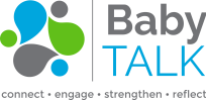
IMPLEMENTATION
Universal Screening/Newborn Encounters
The birth of a child provides professionals with a remarkable opportunity to engage families at a significant time in their lives. There may be a continuum of feelings from elation and joy to anxiety and vulnerability. The newborn period may be the beginning of a professional’s relationship with the family as they adjust to the addition of a new baby. Establishing your role with the family as they allow you to enter their family system will begin or enhance the Baby TALK trustworthy relationship. Developmental theorist Erik Erikson said that during infancy babies are learning about trust and mistrust. So too, families are learning about trust and mistrust within their system of care.
How can you engage so that every family of a newborn feels supported and able to trust that system of care? If we use this opportunity well, we can observe and scaffold the development of new parents as they learn about and interact with their competent newborn. We can establish a trust which parents may transfer to other agencies, medical providers, schools, etc.
At every Baby TALK newborn encounter, the professional connects with the family over their shared interest in the baby promoting these four goals:
-
Connect: To “join” families in the beginning
-
Engage: To discover babies together with families
-
Strengthen: To learn of the opportunities with families
-
Reflect: To offer appropriate resources
In order to meet these goals, professionals use a variety of Baby TALK Family Engagement relationship- building strategies when meeting new parents, including a protocol to guide the encounter and components of the Neonatal Behavior Observation.
This high-quality universal screening opportunity for communities offers the ability to identify unique characteristics of each family, enabling a well-defined community-wide system to meet families where they are from the beginning.
Visiting new parents on the obstetric units when they deliver their babies has proven to be an effective avenue to reach most families in a geographic area, and hospitals are grateful for the continuity of care that a Baby TALK program can provide families after discharge.
